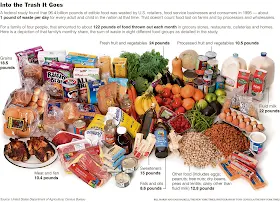 |
| Monthly food waste for average American family of four - click to enlarge |
In the 1940's an average food budget took 30% of personal income. In 2007 only 13% of income was required. Cheap food is easier to waste. However, food is rapidly becoming more expensive.
I try to maintain a zero waste kitchen, not only to honour my food and the people who bring it to me, but also to maximize my food dollar. Mind you, running a kitchen takes time, and one must be constantly vigilant for rogue food just waiting to go bad.
 |
| Food has been getting less expensive since the 1940s... until recently. |
I like to indulge my taste preferences when I prepare meals, but most important is consuming what needs to be eaten in order to make sure food is enjoyed while it is fresh.
So rather than asking, "What do I feel like eating?" I ask, "What needs to be eaten?" By planning meals according to what needs to be eaten, I have cut down on food waste.
The U.S. Department of Agriculture estimated that recovering just 5 percent of waste food could feed four million people a day. A recent survey by the WWF found that 3% of the U.K.'s greenhouse gas emissions come from wasted food. This fumbled food accounted for 6% of the country's water consumption.
Cutting down our food waste may not solve world hunger and greenhouse-gas related problems, but it will go a long way to feeding more of us and taking a burden off our beleaguered atmosphere. And it saves you money.
Tips For Reducing Food Waste
- If you live within walking or biking distance to a good grocery store try buying smaller orders more often. Fresher food and less spoilage results, although it could also lead you to replace your cavernous fridge with a Euro-sized model.
- Be vigilant - don't let food hide in your fridge/freezer. Keep tabs on your precious stocks.
- Use your freezer to extend the life of foods. A full freezer runs more efficiently.
- Save the boiling water from making vegetables for soup.
- Cleaned vegetable scraps/peelings can be used to make vegetable stock. Save up scraps in a container in the freezer until you have a few cups worth to boil up.
- Use all leftovers. For me leftovers are the ultimate fast food.
- Give food away instead of throwing it away. Is there someone around that would appreciate any food you will not be eating? A baker neighbour of mine had a major cheesecake failure that he could not sell, and was going to toss it. I asked for it. It didn't look like it should, but it tasted perfectly great.
- Try gleaning. The term traditionally refers to the act of picking up grain in the fields after the harvest is over. It is used more widely now and could refer to food rescue of any type - picking apples in an orchard after harvest, grocery store dumpster diving, or gathering cast away produce after a farmers market.
- French documentary film maker Agnès Varda made an amazing film about gleaners in modern day France.
- Not as extreme as dumpster diving, you can get produce for a big discount before it hits the dumpster. Most grocery stores sell imperfect produce in a special area, and amazing deals happen here. I get large bags of mushrooms for 50% off, then make mushroom stock to freeze that can later be made into soup or sauces.
- Any organic material that is not eaten can be composted in a pile or worm bin, then used as fertilizer in your vegetable garden.





















